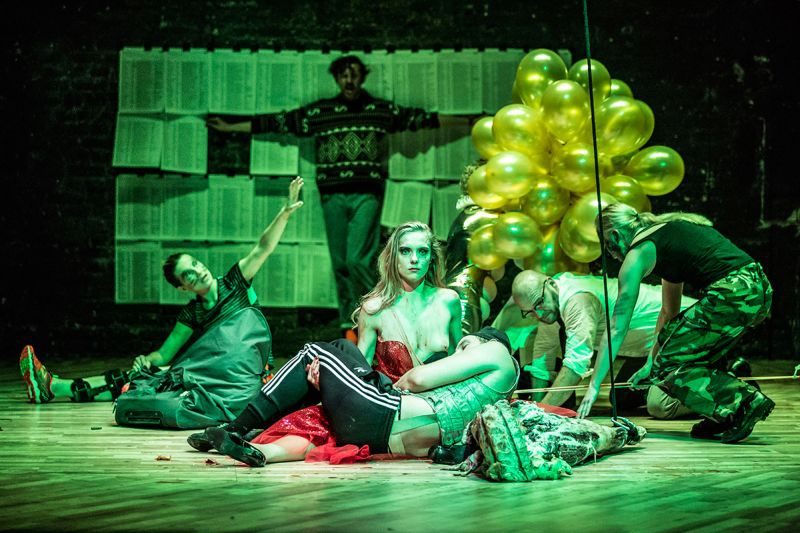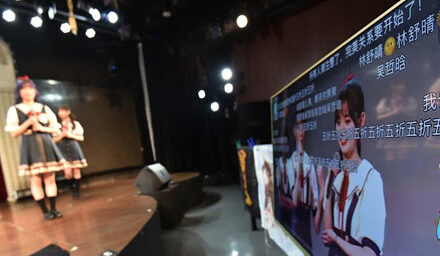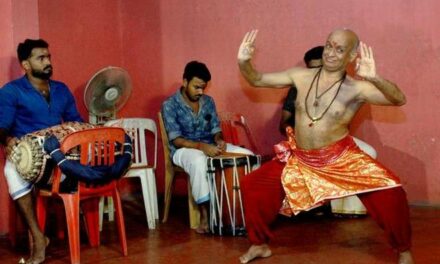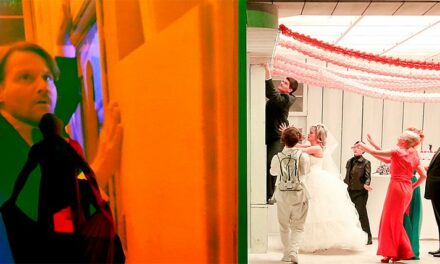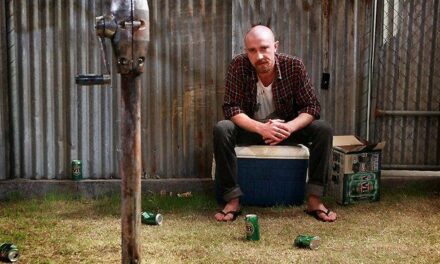


![]()
![]()
Warsaw, The Centrala Theatre/Zachęta, National Gallery of Art: Orestes, directed by Michał Zadara
Poznań, The Polski Theatre: Hunting Scenes From Lower Bavaria, directed by Grażyna Kania
Warsaw, The Zygmunt Hübner Powszechny Theatre in Warsaw: Rage, directed by Maja Kleczewska
Łódź, The Stefan Jaracz Ateneum Theatre: Waiting for Godot, directed by Michał Borczuch
Gdańsk, The Wybrzeże Theatre: The Map and the Territory, directed by Ewelina Marciniak
![]()
![]()
Andrzej Wajda has died aged 90
Congress of Culture 2016
Awards of the monthly Theatre on the 70th anniversary of the magazine
7th edition of Theatre Olympics in Wrocław
![]()
![]()
Katowice “Interpretations” Theatre Festival, November 5th – November 13th, Katowice
The Festival of the New Theatre. Rzeszów Theatre Meetings, November 18th – November 26th, Rzeszów
The Divine Comedy International Theatre Festival, December 8th – December 17th, Kraków
![]()
![]()
 The Centrala Theatre, http://www.centralateatr.pl
The Centrala Theatre, http://www.centralateatr.pl
Euripides Orestes
Directed by: Michał Zadara
Set design: Robert Rumas
Music: Jacek „Budyń” Szymkiewicz
Dramaturgist: Daniel Przastek
Lights: Artur Sienicki
Costumes: Arek Ślesiński
Premiere: August 27th, 2016
More information about the performance at: http://www.centralateatr.pl/orestes.html
Orestes and Elektra is a story of the siblings who killed their mother, the queen, in revenge for the murder of their father. Unfortunately, their actions result with the political chaos in the country. Sentenced to death, driven over the edge, they start killing innocent people. Fear and hatred are growing bigger.
The Centrala Theatre is staging this performance in the Zachęta National Gallery of Art, which is a place where the true political murder was committed. In 1922 President Gabriel Narutowicz was shot to death in the Gallery. Are we allowed to commit a crime in order to liberate the country from the bad government? Are we allowed to sing songs on this subject?
It is a musical performance about the murderers waiting for the verdict.
“Compared with the lavish, almost baroque form of other Zadara’s productions in the repertoire theatres, Oratesproduced, almost on the border of a fringe (alternative) theatre, seems to be as minimalistic as if possible. There is a white manual curtain and three actors wearing black and white official costumes, who play different characters. From time to time they seem to rather answer than actually play their roles and sometimes they exaggerate the antique characters in a grotesque manner. And during the intervals they play the drums and the guitars, turning into a music team.” – Witold Mrozek, Gazeta Wyborcza online – Culture
+++
 Poznań, The Polski Theatre: http://teatr-polski.pl/
Poznań, The Polski Theatre: http://teatr-polski.pl/
Martin Sperr Hunting Scenes From Lower Bavaria
Translation: Sława Lisiecka
Directed by: Grażyna Kania
Dramaturgical cooperation: Paulina Skorupska
Set design and costumes: Sabine Mader
Music: Dominik Strycharski
Premiere: September 2nd, 2016
More information about the performance at:
http://teatr-polski.pl/spektakle/sceny-mysliwskie-dolnej-bawarii/
In his drama Sperr portrays the inhabitants of a small village, in which the presence of one person, who does not fit the rest, results with a sequence of violent acts – incitement against “a stranger” results with various events: a person with a mental disorder commits a suicide and a gay commits a murder. Hunting for the victim continues for so long, that eventually the victim takes revenge on the hunters and becomes the hunter.
The hero of the Sperr’s drama is a society and the laws, both elaborated by the society and ruling this society. The author’s intention is not a denunciation, but an attempt to identify mechanisms. In 1967 Martin Sperr said: “I wanted to show that a human being may become a subject of a hate campaign in any situation, it’s enough that there is someone who wishes to run such a campaign against someone else.” In her performance Grażyna Kania shows us – taking as an example a story of an individual – a social process of discrimination, exclusion from the community and the actions leading to the crime morally justified by the society.
The hero of the Sperr’s drama is a society and the laws, both elaborated by the society and ruling this society. The author’s intention is not a denunciation, but an attempt to identify mechanisms. In 1967 Martin Sperr said: “I wanted to show that a human being may become a subject of a hate campaign in any situation, it’s enough that there is someone who wishes to run such a campaign against someone else.” In her performance Grażyna Kania shows us – taking as an example a story of an individual – a social process of discrimination, exclusion from the community and the actions leading to the crime morally justified by the society.
From the reviews:
“Hunting Scenes From Lower Bavaria is a must-see because it is a performance about the current problems occurring in Poland. About prejudices, disinterested hatred, about the exclusion, which starts from gossips and whispers but ends with the violence against another human being. It is also worth seeing because of Konrad Cichoń debuting with the wonderful role of Piotr B. Dąbrowski and because of Teresa Kwiatkowska, who is still waiting for her big role.” – Mike Urbaniak, www.wysokieobcasy.pl
The drama, written by Martin Sperr (1944-2002) in the mid 60s, the director Grażyna Kania presents as a grim story about the closed circle of violence, yet she adds a pinch of black humour.” – Witold Mrozek, Gazeta Wyborcza, No 225 online
+++
 Warsaw, The Zygmunt Hübner Powszechny Theatre:http://www.powszechny.com/
Warsaw, The Zygmunt Hübner Powszechny Theatre:http://www.powszechny.com/
Elfriede Jelinek Rage
Translation: Karolina Bikont
Directed by: Maja Kleczewska
Dramaturgy: Łukasz Chotkowski
Set design: Zbigniew Libera
Costumes: Konrad Parol
Music: Cezary Duchnowski
Premiere: September 24th, 2016
More information about the performance at:http://www.powszechny.com/spektakle/wscieklosc,s1037.html?ref_page=controller,index,action,index
Elfriede Jelinek started writing Rage after a terror attack at the offices of Charlie Hebdo and after the killing of four customers of a kosher food store. The narrator of Rage is an individual voice, yet very often it takes a form “we” that seems to be flowing from the side of the victims to the side of the fighters.
We become the victims of the anger of the self-appointed freedom fighters who claim that their fate is the fate of the world. Repeatedly orphaned – by a father, a mother, a homeland, possessions and directions – they desert others. Therefore the perspective of those who speak is constantly changing and combining – a multiplied rage, which removes all doubt and inertia, creates certitude and the rules of the game. It is certain that Jelinek wrote a play that has become a sad prophecy of the current reality. “I could be writing Rageindefinitely” – says Jelinek.
From the reviews:
“Kleczewska, once again, stubbornly and relentlessly is posing the questions, following Jelinek: the fundamental and ethical questions, in the face of consistent silence of those who consider themselves to be the leaders and who are personified on the stage by the Cardinal played by Jarmicki.” – Michał Centkowski, Liberté! magazine, October 24th, 2016
“Rage is an indictment against Europe, which every day, through its own sense of superiority and self-satisfaction, contributes to its disintegration. […] The performance justifies itself through the power of the acting expression and through the sense, that it was born from the passion of artists. Simply. And yet, Rage is not just an ad hoc statement. Wonderful set design prepared by Zbigniew Libera moves us to the television studio, but also somewhere else, to the sea, where the refugees, fleeing to a better world, are drowning. There are images, which cause that the performance has a metaphorical meaning.” – Jacek Wakar, Dziennik Gazeta Prawna. No 190 – Culture
+++
Łódź, The Stefan Jaracz Ateneum Theatre:http://www.teatr-jaracza.lodz.pl
Samuel Beckett Waiting for Godot
Translation: Antoni Libera
Directed by: Michał Borczuch
Set design and costumes: Dorota Nawrot
Lights: Jacqueline Sobiszewski
Premiere: October 15th, 2016
More information about the performance at:http://nowaklasyka.pl/czekajac.html
“Nothing can be done” – these words begin Waiting for Godot, a play by Samuel Beckett. The characters of the play keep on repeating this sentence, like a refrain, during the whole performance. This sentence shapes the parameters of their world, but also their attitude towards this world.
“Nothing can be done,” repeats also any director attempting to stage Waiting for Godot nowadays. Protected by the rigorous copyrights, the text initially becomes a score of previously described gestures, tones, emotions, and stage movement. The characters, reduced to the minimal level of their existence, are trying to verify/redetermine the boundaries of reality, which they start to gradually forget. The author of a play determines strictly, in his last will, only what is forbidden in the interpretation of his text. Is there any space for creative freedom of expression? Or maybe, in order to tell about the enslavement, one needs to get stuck in the sealed Beckettian structure?
The performance was presented at the opening of the 4th International Festival “New Classics of Europe”
From the reviews:
“Borczuch operates subtly. Not rewriting (God forbid!) the text, he exchanges the characters between the actors and arranges them into new configurations. […] In his performance Borczuch carries a subtle game with repetitions, identity and time, which for 1 hour and 40 minutes flows in a completely different way. In this performance, which opened the New Classic of Europe festival in Łódź, the text of Beckett gained a completely new life.” – Witold Mrozek, Gazeta Wyborcza online
Waiting for Godot directed by Michał Borczuch is a self-referential performance. The main subject of reflection is here the process of reading the Beckett’s text as a canonical piece of art and creating the performance restricted due to the rigour of the adaptive correctness. The question about artistic freedom matches the motto of this year’s edition of the New Classics of Europe festival. “- Izabella Adamczewska Gazeta Wyborcza – Łódź online
Gdańsk, The Wybrzeże Theatre: http://www.teatrwybrzeze.pl
Michel Houellebecq The Map and the territory
Directed by: Ewelina Marciniak
Translation, literary adaptation and dramaturgy: Jan Czapliński
Set design, costumes and lights: Katarzyna Borkowska
Premiere: October 14th, 2016
More information about the performance at:http://www.teatrwybrzeze.pl/spektakle/mapa-i-terytorium
Implementation of a yearning for the art, which allows us to really experience something, something different from the galleries and from the rising prices of the objects of art, is associated with the ultimate experiences, such as transience, death,and even murder. These plots of the Houellebecq’s novel are, the most important for the authors of the performance. The performance follows the artistic path told by the writer, the path of its main character – Jed Martin, trying to reflect on how his choices may resonate with the current situation of the theatre and what Jed’s art may say about the spectators and the authors of this performance The authors are playing with the convention of a crime story, seeking for the answer – who killed Michel Houellebecq. They also contemplate the ontological dimension of this crime story. In the name of what the author must sacrifice himself in the novel? Why the murder of Houellebecq has to be so terrifying? Does the world create the crime, or does the crime create the world? Are we ready, under appropriate conditions, to recognize the murder as the work of art? And if so, is art the basis, which let us really experience something?
From the reviews:
“How to present on stage a story full sadness and disappointment, a story about loneliness and boredom, avoiding at the same time this boredom? How to enliven the characters that constantly hide behind different masks, without falling into the claptrap? Ewelina Marciniak, who has directed the most important novel of Michel Houellebecq, succeeds with this project. Mostly because of the fact that, in the Gdańsk version of The Map and the Territory, impressions, moods and “the joyful impetus of negation” are more important than the adequacy of a literary adaptation. The pleasure of plunging into fiction is a primary goal of this performance.” – Michał Centkowski, Newsweek Polska. No 44
![]()
Andrzej Wajda has died aged 90
Andrzej Wajda has passed away on October 9th. He was one of the most outstanding Polish film and theatre directors. Wajda co-created the cinema of moral anxiety and was frequently honoured for his contribution to the development of cinematography: in 2000 he received a Lifetime Achievement Academy Award (Oscar). His lifetime achievement was also awarded the Golden Lion Prize and the Golden Bear prize. He was also awarded, among others, the Palme d’Or, the European Film Award “Felix” and the Japanese Kyoto Prize. He directed a few dozen films, the most popular are: Ashes and Diamonds, The Ashes, The Promised Land (nominee for Oscar in 1975 for Best Foreign Language Film), Man of Marble, The Maids of Wilko (nominee in 1979), Man of Iron (nominee in 1981), Pan Tadeusz, Katyń (nominee in 2007) and Walesa. Man of Hope.
Andrzej Wajda was also very successful in theatre directing. In 1963 he started his cooperation with the Stary Theatre in Kraków, where he directed, among others: The Wedding by Stanisław Wyspiański (1971) or The Demons by Fyodor Dostoyevsky. One of his important performances was The Danton Case by Stanisława Przybyszewska, staged in the Zygmunt Hübner Powszechny Theatre (1976). His performances from the 70s (such as Nastasja Filipovna, based on The Idiot by Fyodor Dostoyevsky or As the Days Pass, As the Years Pass…) made him one of the greatest Polish theatre artists. Just like in the film, also on stage Wajda was not afraid of entering into the center of political disputes. That was, for example, in the case of Antigone by Sophocles (The Stary Theatre in Kraków, 1984), in which Wajda embodied the reality of the martial law. He was not afraid of various experiments: in 1989 he cast Teresa Budzisz – Krzyżanowska as Hamlet (The Stary Theatre in Kraków). His last performance was Macbeth(The Stary Theatre, 2004) and his last film was Afterimage – a story about the painter Władysław Strzemiński, which will take part in this year’s Academy Awards competition.
++
Congress of Culture 2016
Between October 7th and 9th the participants of the Congress of Culture 2016 debated in the Palace of Culture on various subjects connected with contemporary culture. One of the main questions was, what kind of culture we need nowadays, how to protect its autonomy and how to provide artists with artistic freedom. The topics of the Congress were collected in 42 working groups and the whole Congress was completed with a panel, during which various recommendations – proposals developed by these groups were presented. The participants of the Congress have formulated over 100 demands, in order to present them to the central government and to the local cultural institutions, schools, enterprises and artists. The most important among these postulates are: to increase the role of education for culture and through culture, strengthen the role of institutions, which popularize culture, allocate 1 % of the Corporate Income Tax for culture, fight discrimination against women more actively (also in the cultural institutions), provide social insurance for artists without full-time employment, develop methods for the integration of immigrants and better protection of ethnic minorities and treat more seriously culture for children and children as culture consumers.
Congress of Culture is a citizen’s, grassroots initiative. So far it has been convened in the most important moments of the Polish contemporary history: the first one, in 1981, it was brutally interrupted by introduction of martial law in Poland, the second one took place at the threshold of the new millennium, in December 2000, the third one, which was is an attempt to summarize twenty years of the Polish freedom and to define the role of culture in public life, in contemporary Poland was held in 2009.
This year’s Congress was the fourth in the history of Poland.
More information about the Congress at: http://www.kongreskultury2016.pl
++
Awards of the monthly „Theatre” on the 70th anniversary of the magazine
On October 18th, at the Zbigniew Raszewski Theatre Institute, the editors of the monthly Theatre presented the awards for the theatrical season 2015/2016. The Konrad Swinarski Prize was granted to Eimuntas Nekrošius, for directing Forefathers by Adam Mickiewicz, in an adaptation of Rolandas Rastauskas, with set design by Marius Nekrošius and music by Paweł Szymański, staged at the National Theatre in Warsaw. The winners of the Alexander Zelwerowicz Prize for Best Actor were: Dorota Kolak and Miroslaw Baka for their roles in Who’s Afraid of Virginia Woolf?, by Edward Albee, directed by Grzegorz Wiśniewski in the Coastal Theatre in Gdansk. Jan Englert – the artistic director of the National Theatre was awarded the Special Prize of the jury, among others, for carrying out in the unique way the celebration of the 250th anniversary of the national stage in Poland. The editors also awarded Krystian Lupa – the greatest contemporary theatre director – the prize of 70th anniversary of the magazine Theatre, for outstanding achievements in the field of staging, original contribution to the development of Polish and world theatrical stage arts and world theatrical idea, for making the Polish theatre famous abroad, as well as for bringing up an entire generation of talented successors.
More information at: www.teatr-pismo.pl
++
7th edition of the Theatre Olympics in Wrocław
On October 14th, the performance The Trojan Women directed by the Japanese director Tadashi Suzuki opened the 7th edition of the Theatre Olympics in Wrocław. This prestigious event was one of the key points of the artistic program of the European Capital of Culture Wrocław 2016 and one of the most important theatre festivals in the world. The first edition of the Theatre Olympics was held in Delphi, in Greece. Later on the festival was held, among others, in Moscow (2001), Istanbul (2006) or Seoul (2010). The previous Theatre Olympics were held in Beijing, in 2014.
Wroclaw organized the seventh edition of Theatre Olympics under the slogan “The World as a place of truth.” This is a paraphrase of the title of the speech delivered by Jerzy Grotowski in 1976. Within the Main Section of the festival were presented sixteen performances of artists from all over the world. The audience had a chance to see, among others, two performances directed by Theodoros Terzopoulos, who was the founder of the Theatre Olympics. Within the Main Stream the following performances were also presented: Battlefielddirected by the British director Peter Brook, Go Down, Mosesdirected by the Italian director Romeo Castellucci, Wait, wait, wait… (for my father) directed by the Belgian director Jan Fabre or Masquerade: Recollections of the Future directed by the Russian director Valery Fokin. The Polish theatre was represented by the performance of Krystian Lupa The Temptation of Quiet Veronica and two performances of the Wrocław ZAR Theatre: Anime, Sister and Medeas: On Getting Across. The program also included Forefathers directed by the Lithuanian director Eimuntas Nekrošius. The directors of performances presented within the Main Section arrived to Wrocław and took part in the series of meetings “The Truth and Nothing but the Truth” where they presented their artistic credos. Another section within the festival program, “More than Theatre”, was dedicated to the art of people with disabilities. The last events of the Theatre Olympics will take place on November 13th.More information at: http://www.theatreolympics2016.pl/
++
![]()
“Interpretations” Theatre Festival
18th edition, November 5th – November 13th, Katowice
Organizer: The City of Gardens – Krystyna Bochenek Katowice Cultural Centre
Contact: bow@miasto-ogrodow.eu
http://festiwal-interpretacje.pl
The 18th edition of “Interpretations” Theatre Festival in Katowice will take place under the motto “Stop the Violence”. The program includes five competing performances, one master performance and the premiere of the Silesia Theatre. For the Grand Prix, the Konrad Prize, will compete following performances: White Memory, Black Power directed by Piotr Ratajczak from the Aleksander Węgierko Drama Theatre in Białystok, Zero Point: The Kindly Ones (based on the novel by Jonathan Littell) directed by Janusz Opryński from the Provisorium Theatre, Kumernis, Or How Holy Lady Grew a Beard directed by Agata Duda-Gracz from the Musical Theatre in Gdynia, Unbearable Long Embraces directed by Ivan Vyrypaev from the Zygmunt Hübner Powszechny Theatre in Warsaw and An Enemy of the People directed by Jan Klata from the National Stary Theatre in Kraków. The festival will end up on November 13th, with the master performance The Supplicants directed by Paweł Miśkiewicz (based on a text by Elfriede Jelinek) from the National Stary Theatre in Kraków, starring Krzysztof Globisz who, after a serious illness returns on stage. The accompanying event of this year’s festival will be the premiere of Leni Riefenstahl. Oblivion Episodes directed by Ewelina Marciniak.
++
The Festival of the New Theatre. Rzeszów Theatre Meetings
3rd edition, November 18th – November 26th, Rzeszów
Organizer: Wanda Siemaszkowa Theatre in Rzeszów
Contact: sekretariat@teatr-rzeszow.pl
www.teatr-rzeszow.pl
“The beginning and the End” is a leading motto of the 55th edition of the Rzeszów Theatre Meetings, which will be at the same time the 3rd edition of the Festival of the New Theatre. The program includes about twenty various artistic and educational events. The audience will see eleven performances; seven of them will take part in the competition. They will be evaluated by the jury chosen among young artists. Among the performances taking part in the competition will be: An Enemy of the People (based on the text of Henrik Ibsen) directed by Jan Klata from the National Stary Theatre in Kraków, Nights and Days I will be missing you (based on the novel Nights and Days by Maria Dąbrowska) directed by Zuzanna Bućko and Szymon Bogacz (the Polish Theatre in Bielsko-Biała), Orestes by Euripides directed by Michał Zadara from the independent Centrala Theatre in Warsaw or Waiting for Godot by Samuel Beckett directed by Michał Borczuch from the Stefan Jaracz Ateneum Theatre in Łódź. The 55th Rzeszów Theatre Meetings will end with the final gala, during which the jury will announce the verdict.
++
The Divine Comedy International Theatre Festival
9th edition, December 8th – December 17th, Kraków
Organizers: Łaźnia Nowa Theatre and Krakow Festival OfficeContact: info@boskakomedia.pl
www.boskakomedia.pl
The leading theme of this year’s edition of the festival is the slogan “Poland has not yet perished, So long as the theatre is alive” (referring to the lyrics of the Polish National Anthem – Poland has not yet perished, So long as we still live). The audience will see in total twenty eight performances, ten of them in the main competition INFERNO: The Histrionic directed by Agnieszka Olsen from the Stefan Jaracz Ateneum Theatre in Łódź, Dybbuk directed by Anna Smolar from the Polish Theatre in Bydgoszcz, White Power, Black Memory directed by Piotr Ratajczak from the Aleksander Węgierko Drama Theatre in Białystok, Kumernis, Or How Holy Lady Grew a Beard directed by Agata Duda-Gracz from the Musical Theatre in Gdynia, The Wedding directed by Radosław Rychcik from the Silesia Theatre in Katowice, We Get What We Believe In directed by the artistic duo Wiktor Rubin and Jolanta Janiczak from the Zygmunt Hübner Powszechny Theatre in Warsaw, Robert Robur directed by Krzysztof Garbaczewski from TR Warszawa, two performances from the National Stary Theatre in Kraków – The Supplicants directed by Paweł Miśkiewicz and An Enemy of the People directed by Jan Klata, as well as All about my motherdirected by Michał Borczuch from the Łaźnia Nowa Theatre in Kraków. Among these performances the international jury from Chile, Japan, Finland and the United Kingdom will choose the best performance of the season and will award the most important theatre prizes. In the newly created, in this year’s edition, competition for young artists – PARADISO we will see eight performances, directed by: Magda Szpecht, Katarzyna Kalwat, Kuba Roszkowski, Anna Karasińska, Teo Dumski, Małgorzata Warsicka, Jakub Skrzywanek and Aneta Groszyńska. Within the section PURGATORIO we will see two theatre premieres: The Plastics by Marius von Mayenburg, directed by Grzegorz Wiśniewski and The Whales directed by Eva Rysova, as well as two foreign performances: The Institute of Memorydirected by Lars Jan and Princess Dramas directed by Michał Borczuch from the Slovenian theatre Mladinsko Theatre.++

![]()
copyright © 2013 Poland On Stage
This post was written by the author in their personal capacity.The opinions expressed in this article are the author’s own and do not reflect the view of The Theatre Times, their staff or collaborators.
This post was written by Lauren Dubowski.
The views expressed here belong to the author and do not necessarily reflect our views and opinions.

